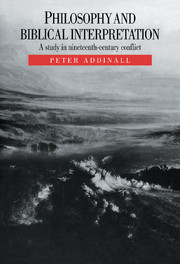Book contents
- Frontmatter
- Contents
- Preface
- Introduction
- 1 The general picture
- 2 David Hume
- 3 William Paley
- 4 Biblical conservatism
- 5 Conservative natural theology: Paley's design argument
- 6 Conservative natural theology: Thomas Chalmers
- 7 Liberal natural theology
- 8 The later nineteenth century
- 9 Immanuel Kant
- 10 Critical philosophy and the Bible
- Conclusion
- Notes
- Bibliography
- Index
8 - The later nineteenth century
Published online by Cambridge University Press: 23 December 2009
- Frontmatter
- Contents
- Preface
- Introduction
- 1 The general picture
- 2 David Hume
- 3 William Paley
- 4 Biblical conservatism
- 5 Conservative natural theology: Paley's design argument
- 6 Conservative natural theology: Thomas Chalmers
- 7 Liberal natural theology
- 8 The later nineteenth century
- 9 Immanuel Kant
- 10 Critical philosophy and the Bible
- Conclusion
- Notes
- Bibliography
- Index
Summary
The year i860 may be taken as a convenient, if not perfectly precise, chronological marker with respect to thought about religion in Britain. The evidences in favour of a wholly naturalistic interpretation of life, including religion, had been growing stronger throughout the century, and by the year i860 a kind of breaking point or turning of the tide had been reached. A profound and lasting trend was established, and it was the triumph of scientific method: not the consequence of some sudden revelation or discovery, but as the culmination of intellectual endeavour going back to the eighteenth century. Basil Willey links the publication of The Origin of Species, of Essays and Reviews and of Colenso's The Pentateuch and the Book of Joshua Critically Examined as ‘Three great explosions … which rocked the fabric of Christendom and sent believers scuttling for shelter’ but while these events unquestionably made a sharp impact on thinking people, they did not of themselves establish some unheard of novelty which in turn set in motion or released forces hitherto dormant. They were symptomatic of a social and intellectual shift long since begun, and by expressing it they increased awareness of change already proceeding and encouraged it.
The idea of an evolutionary explanation for the appearance of life on the planet was by no means new; and the evidence in its favour was always gradually accumulating, a fact to which the Bridgewater Treatises themselves bore witness in contradiction to their main intention.
- Type
- Chapter
- Information
- Philosophy and Biblical InterpretationA Study in Nineteenth-Century Conflict, pp. 172 - 216Publisher: Cambridge University PressPrint publication year: 1991



